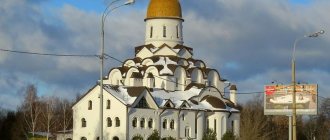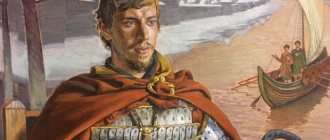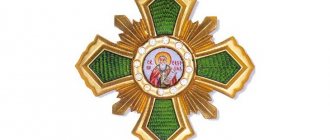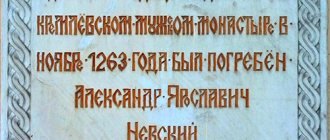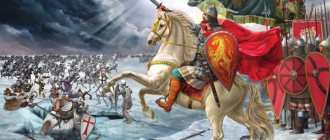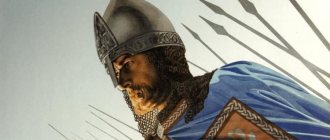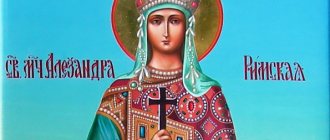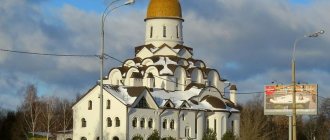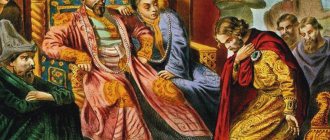Childhood and youth
Alexander Yaroslavich Nevsky was born in the city of Pereslavl-Zalessky. Yaroslav Vsevolodovich, Alexander’s father, was the Prince of Pereyaslavl at the time of his son’s birth, and later the Grand Duke of Kyiv and Vladimir. Rostislava Mstislavna, the mother of the famous commander - Princess of Toropets. Alexander had an older brother Fedor, who died at the age of 13, as well as younger brothers Andrei, Mikhail, Daniil, Konstantin, Yaroslav, Afanasy and Vasily. In addition, the future prince had sisters Maria and Ulyana.
Portrait of Alexander Nevsky
At the age of 4, the boy underwent the rite of initiation into warriors at the Spaso-Preobrazhensky Cathedral and became a prince. In 1230, his father put Alexander and his older brother in charge of Novgorod. But after 3 years, Fedor dies, and Alexander remains the only legal successor of the principality. In 1236, Yaroslav left for Kyiv, then to Vladimir, and the 15-year-old prince was left to rule Novgorod on his own.
Family of Alexander Nevsky
Alexander's father was the current prince Yaroslav Vsevolodovich. Alexandra's mother is the daughter of Prince Mstislav the Udal. Alexander's maternal grandfather was famous for his exploits. It was this man who became the standard for the future prince. The great-grandfather was Mstislav the Brave, who was the grandson of Vladimir Monomakh himself.
The boy's beloved grandfather died when he was 8 years old. This man did not pay much attention to the issues of raising the boy, but it was from him that Alexander inherited the strongest aspects of his character. The child adopted courage and bravery from his father.
What awaited Alexander in the future was predetermined in advance. Sooner or later, he would have to take the princely throne, which means become the main military commander, legislator, defender of his land and benefactor, bearing his powers with dignity and honor.
First campaigns
The biography of Alexander Nevsky is closely connected with wars. Alexander took his first military campaign with his father to Dorpat with the goal of recapturing the city from the Livonians. The battle ended with the victory of the Novgorodians. Then the war for Smolensk with the Lithuanians began, victory in which remained with Alexander.
Alexander Nevsky on a military campaign
On July 15, 1240, the Battle of the Neva took place, significant in that Alexander’s troops, without the support of the main army, set up a Swede camp at the mouth of the Izhora River. But the Novgorod boyars were afraid of Alexander's increased influence. Representatives of the nobility, with the help of various tricks and incitements, ensured that the commander went to Vladimir to his father. At this time, the German army made a campaign against Rus', capturing the Pskov, Izborsk, and Vozh lands; the knights took the city of Koporye. The enemy army came close to Novgorod. Then the Novgorodians themselves began to beg the prince to return.
Icon of Alexander Nevsky
In 1241, Alexander Nevsky arrived in Novgorod, then liberated Pskov, and on April 5, 1242, the famous battle took place - the Battle of the Ice - on Lake Peipsi. The battle took place on a frozen lake. Prince Alexander used tactical cunning, luring knights dressed in heavy armor onto a thin layer of ice. The Russian cavalry attacking from the flanks completed the defeat of the invaders. After this battle, the knightly order abandoned all recent conquests, and part of Latgale also went to the Novgorodians.
Map of the battles of Alexander Nevsky
After 3 years, Alexander liberated Torzhok, Toropets and Bezhetsk, captured by the army of the Grand Duchy of Lithuania. Then, solely with the help of his own army, without the support of the Novgorodians and Vladimirites, he caught up with and destroyed the remnants of the Lithuanian army, and on the way back he defeated another Lithuanian military formation near Usvyat.
Education of Alexander Nevsky
The young man was brought up under the leadership of boyar Fyodor Danilovich. He was taught the rules of behavior in society, literacy, history and reading. To broaden his horizons, Nevsky began to attend princely courts, where they listened to complaints from local residents and helped resolve controversial issues. So Nevsky was able to quickly comprehend all the nuances of the legislation of that time. At that time, the main legislative document was “Russian Truth”. In the city of Novgorod, the future commander learned the nuances of conducting domestic and foreign policy, the nuances of diplomatic affairs. The knowledge gained in the future will help the prince subjugate the boyars and ordinary people, whose mood at that time could be unpredictable.
A special place in Nevsky’s training process was given to mastering military tactics and the rules of combat. Mastering the art of equestrianism, learning to use weapons, knowing the peculiarities of mounted and foot formations is a whole science.
According to the science of psychology, the formation of personality is influenced by the following factors:
- heredity;
- the environment in which the person grew up;
- personal experience gained during certain life situations.
Governing body
In 1247 Yaroslav died. Alexander Nevsky becomes Prince of Kyiv and All Rus'. But since Kyiv lost its strategic importance after the Tatar invasion, Alexander did not go there, but stayed to live in Novgorod.
In 1252, Andrei and Yaroslav, Alexander's brothers, opposed the Horde, but the Tatar invaders defeated the defenders of the Russian land. Yaroslav settled in Pskov, and Andrei was forced to flee to Sweden, so the Principality of Vladimir passed to Alexander. Immediately after this a new war followed with the Lithuanians and Teutons.
Prince Alexander Nevsky
The role of Alexander Nevsky in history is perceived ambiguously. The Novgorod prince constantly fought battles with Western troops, but at the same time bowed to the khan of the Golden Horde. The prince repeatedly traveled to the Mongol Empire to honor the ruler, especially supporting Batu and the Khan’s allies. In 1257, he even personally appeared in Novgorod with Tatar ambassadors to express support for the Horde.
Alexander Nevsky in the tent of Khan Batu
In addition, Alexander exiled his son Vasily, who resisted the invasion of the Tatars, to the Suzdal land, and put 7-year-old Dmitry in his place. Such a policy of the prince in Russia itself is often called treacherous, since cooperation with the rulers of the Golden Horde suppressed the resistance of the Russian princes for many years to come. Many do not perceive Alexander as a politician, but they consider him an excellent warrior, and they do not forget his exploits.
Prince Alexander Nevsky receives papal legates
In 1259, Alexander, with the help of threats of a Tatar invasion, obtained from the Novgorodians consent to a population census and payment of tribute to the Horde, which the Russian people resisted for many years. This is another fact from Nevsky’s biography that does not please the prince’s supporters.
Battle on the Ice
At the end of August 1240, the crusaders of the Livonian Order invaded the Pskov land. After a short siege, the German knights captured Izborsk. Then the defenders of the Catholic faith besieged Pskov and occupied it with the assistance of the traitor boyars. This was followed by an invasion of Novgorod land.
At the call of Alexander Nevsky, troops from Vladimir and Suzdal arrived to help the Novgorodians under the command of Prince Andrey, the brother of the Novgorod ruler. The united Novgorod-Vladimir army launched a campaign against Pskov land and, cutting off the roads from Livonia to Pskov, took this city, as well as Izborsk, by storm.
Prince Alexander Nevsky at the Battle of the Ice
After this defeat, the Livonian knights, having gathered a large army, marched to the Pskov and Peipsi lakes. The basis of the army of the Livonian Order was the heavily armed knightly cavalry, as well as infantry, which many times outnumbered the knights. In April 1242, a battle took place that went down in history as the Battle of the Ice.
For a long time, historians could not determine the exact location of the battle, because the hydrography of Lake Peipus often changed, but scientists later managed to indicate the coordinates of the battle on the map. Experts agreed that the Livonian Rhymed Chronicle more accurately describes the battle.
Lake Peipsi
The “Rhymed Chronicle” states that Novgorod had a large number of shooters who were the first to take the blow of the knights. The knights lined up in a “pig” - a deep column starting with a blunt wedge. This formation allowed the heavily armed knightly cavalry to deliver a ramming attack on the enemy line and break battle formations, but in this case such a strategy turned out to be wrong.
While the advanced detachments of the Livonians tried to break through the dense formation of the Novgorod infantry, the princely squads remained in place. Soon the vigilantes struck the enemy’s flanks, crushing and confusing the ranks of the German troops. The Novgorodians won a decisive victory.
Battle of Lake Peipsi
Some historians claim that the knightly units consisted of 12-14 thousand soldiers, and the Novgorod militia numbered 15-16 thousand people. Other experts consider these figures to be exorbitantly high.
The result of the battle decided the outcome of the war. The Order made peace, abandoning the conquered Pskov and Novgorod territories. This battle played a huge role in history, influenced the development of the region, and preserved the freedom of the Novgorodians.
Personal life
Alexander Nevsky married in 1239, immediately after the victory over the Lithuanians near Smolensk. The prince's wife was Alexandra, daughter of Bryachislav of Polotsk. The newlyweds got married in the Church of St. George in Toropets. A year later their son Vasily was born.
Monument to Alexander Nevsky
Later, the wife gave Alexander three more sons: Dmitry, the future prince of Novgorod, Pereyaslav and Vladimir, Andrei, who would be the prince of Kostroma, Vladimir, Novgorod and Gorodets, and Daniel, the first prince of Moscow. The princely couple also had a daughter, Evdokia, who later married Konstantin Rostislavich of Smolensk.
Death
In 1262, Alexander Nevsky went to the Horde to try to prevent the planned Tatar campaign. The new invasion was provoked by the murders of tribute collectors in Suzdal, Rostov, Pereyaslavl, Yaroslavl and Vladimir. In the Mongol Empire, the prince became seriously ill, and returned to Rus' already dying.
Monument to Alexander Nevsky
Upon returning home, Alexander Nevsky takes a solemn oath of Orthodox monks under the name Alexy. Thanks to this act, as well as due to the regular refusals of the Roman Papacy to accept Catholicism, Grand Duke Alexander became the favorite prince of the Russian clergy. Moreover, in 1543 he was canonized by the Russian Orthodox Church as a miracle worker.
Sarcophagus of Alexander Nevsky
Alexander Nevsky died on November 14, 1263, and was buried in the Nativity Monastery in Vladimir. In 1724, Emperor Peter I ordered the relics of the holy prince to be reburied in the Alexander Nevsky Monastery in St. Petersburg. The monument to the prince was erected on Alexander Nevsky Square in front of the entrance to the Alexander Nevsky Lavra. This monument is presented in photographs in historical publications and magazines.
Peter I transports the relics of Alexander Nevsky to St. Petersburg. Relief on the door of St. Isaac's Cathedral
It is known that part of the relics of Alexander Nevsky is located in the Temple of Alexander Nevsky in Sofia (Bulgaria), as well as in the Assumption Cathedral of Vladimir. In 2011, the image with a particle of the relics was transferred to the Alexander Nevsky Church in the Ural village of Shurala. The icon of the Holy Blessed Prince Alexander Nevsky can often be found in Russian churches.
The meaning of the holy image in history
After the death of Alexander Nevsky, he began to be revered as a saint, although the official canonization of his appearance occurred only in 1547. This happened not because of the military achievements of the prince, but because for Orthodox Christians he became famous for his sincere deep faith and virtues.
In particular, thanks to his efforts, the Christian faith spread to the lands of the northern Pomors and the first Orthodox diocese was created in the Golden Horde.
Interesting Facts
- Prince Alexander won his main military victories in his youth. By the time of the Battle of the Neva, the commander was 20 years old, and during the Battle of the Ice the prince was 22 years old. Subsequently, Nevsky was considered a politician and diplomat, but more of a military leader. In his entire life, Prince Alexander did not lose a single battle.
- Alexander Nevsky is the only secular Orthodox ruler in all of Europe and Rus' who did not compromise with the Catholic Church in order to maintain power.
Icon of Alexander Nevsky
- After the death of the ruler, “The Tale of the Life and Courage of the Blessed and Grand Duke Alexander” appeared, a literary work of the hagiographic genre created in the 80s of the 13th century. It is assumed that the compilation of “The Life of Alexander Nevsky” was carried out in the Monastery of the Nativity of the Virgin Mary in Vladimir, where the prince’s body was buried.
- Feature films are often made about Alexander Nevsky. In 1938, the most famous film was released, called “Alexander Nevsky”. The director of the film was Sergei Eisenstein, and the cantata “Alexander Nevsky” was created for the choir and soloists with an orchestra by the Soviet composer Sergei Prokofiev.
- In 2008, the “Name of Russia” competition took place. The event was organized by representatives of the state TV channel “Russia” together with the Institute of Russian History of the Russian Academy of Sciences and the Public Opinion Foundation.
- Internet users chose the “Name of Russia” from a ready-made list of “five hundred great figures of the country.” As a result, the competition almost ended in scandal, because Joseph Stalin took the leading position. Organizers said that “numerous spammers” voted for the communist leader. As a result, Alexander Nevsky was named the official winner. According to many, it was the figure of the Novgorod prince that should have satisfied both the Orthodox community and Slavophile patriots, as well as simply lovers of Russian history.
Prayers
Troparion, tone 4
Like the pious root/ most honorable branch you were, O blessed Alexandra:/ Christ revealed you, like some Divine treasure of the Russian land,/ a new wonderworker, glorious and acceptable to God./ And today we have come together in your memory through faith and love, / rejoicing in psalms and songs , we praise the Lord, / who has given you the grace of healing. / Pray to Him to save this city, / and the power of your relatives [2] to be pleasing to God // and to be saved by the sons of Russia
.
Troparion for the transfer of relics, same voice
Know your brethren, Russian Joseph,/ not in Egypt, but reigning in Heaven,/ blessed Prince Alexander,/ and accept their prayers,/ multiplying the lives of the people with the fruitfulness of your land,/ gra Yes of thy dominion, protecting by prayer// and by Orthodox Christians against the opposition
.
Kontakion, tone 8
(Similar to: Like the firstfruits)
Like a bright star, we honor you, / who shone from the east and came to the west: / for you enrich this entire country with miracles and kindness / and enlighten with faith those who honor your memory, blessed Alexandra. / This For today’s sake, we celebrate your dormition, your people:/ pray save your Fatherland and all those who flow to the race of your relics / and those who truly cry out to you // Rejoice, strengthening of our city
.
Kontakion for the Transfer of Relics, Tone 4
Just like your relatives Boris and Gleb/ appeared from Heaven to help you,/ struggling against Welger of Svejsk and his warriors,/ so you too now,/ blessed Alexandra,/ come to your help our kinsmen// and overcome those who fight us
.
Greatness
We magnify you,/ blessed Prince Alexandra,/ and honor your holy dormition,/ and now pray for us// Christ our God.
(November 23)
We magnify you,/ blessed Prince Alexandra,/ and honor your holy memory,/ for you pray for us// Christ our God.
(August 30)
